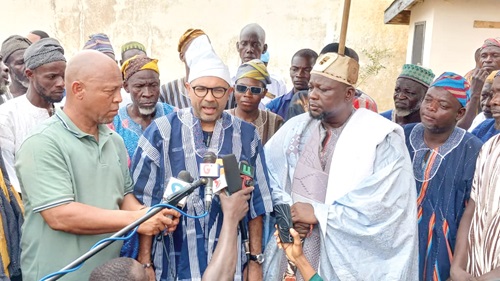
EU intervenes to address perennial water crisis in Tamale, Damongo
The European Union (EU) has stepped in to support efforts to resolve the perennial water crisis facing residents of Tamale and its surrounding communities, as well as the Damongo township.
This comes as a relief to thousands of households that have endured irregular water supply for years due to ageing infrastructure and malfunctioning equipment at the Dalun and Damongo water treatment plants.
The maintenance work would involve fixing broken-down pumps and obsolete equipment at the treatment plants and expanding existing capacity to boost water supply to the affected areas.
The EU Ambassador to Ghana, Irchad Razaaly, announced this when he visited the Dalun Treatment Plant to assess its current condition.
As part of the visit, he interacted with the Northern Regional Minister, Ali Adolf John, the Chief of Dalun, Naa Mohammed Mustapha and various stakeholders to understand the scope of the problem to facilitate the intervention.
Water crisis
For many years, the Tamale and Damongo townships have been facing acute water shortages, compelling residents to resort to untreated water sources for domestic purposes.
The Tamale Water System, which was originally built in 1972, has only undergone one major expansion in 2008.
Officials from Ghana Water Limited attribute the water shortages to ageing infrastructure and a rapidly growing population that has outpaced the system’s supply capacity.
Currently, out of five pumps at the Dalun Water Treatment Plant, only two are functioning.
Also, Tamale requires 90,000 to 95,000 cubic metres of water per day. However, the Ghana Water Company Limited can produce 35,000 to 38,000 cubic metres.
Increased water supply
In his remarks, Mr Razaaly indicated that the intervention is estimated to cost about €300 million, adding that it is expected to significantly increase the gallons of water supplied to residents of the areas.
"We are looking at expanding the existing capacity, which is a huge project. We have the technical expertise and resources for the project.
“Currently, we are engaging all the relevant stakeholders to come out with a clear plan for the execution of the intervention, " he said.
He said access to clean water was not a luxury but a basic human right, for which reason the EU was committed to partnering with Ghana to ensure that right is fulfilled.
Timely support
Naa Mustapha lauded the EU for its timely support and said the project, when completed, would go a long way to resolve the perennial water crisis in the areas.
The regional minister also said the persistent lack of water had become a security threat, and urgent measures needed to be taken to ensure a sustainable water supply.
Writer's email:
